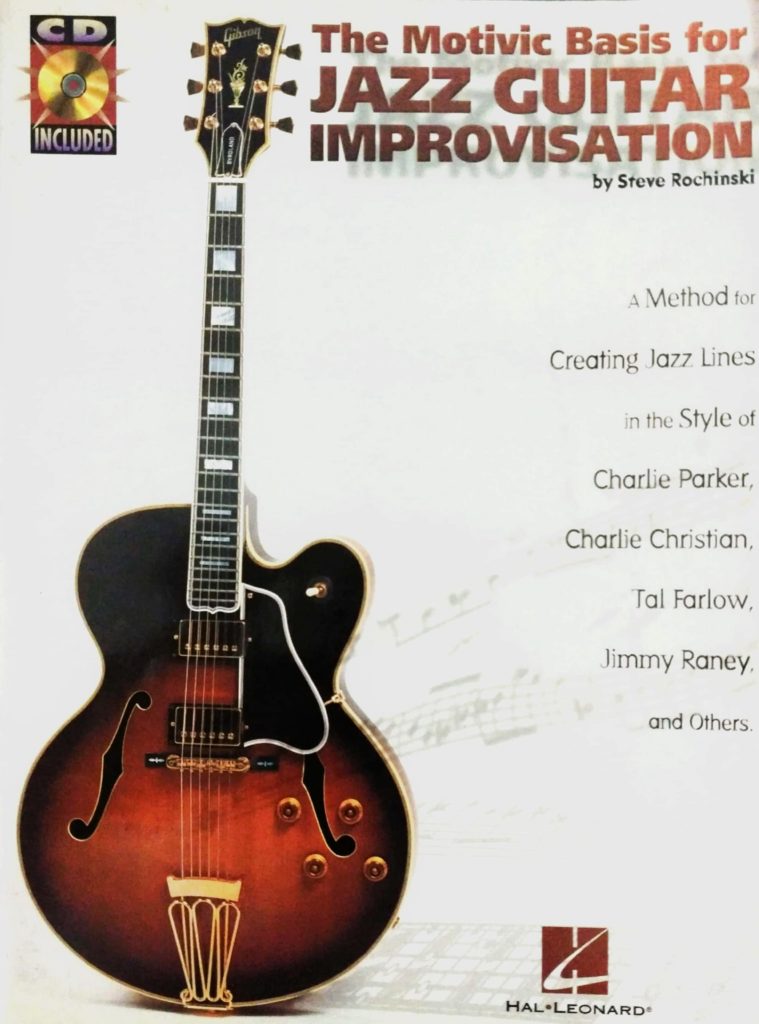
This book along with Steve Rochinski’s Jazz Style of Tal Farlow : The Elements of Bebop Guitar book are really useful books for long term study & reference. At the simplest level, this book is carefully curated collection of Charlie Parker motives along with how it can be played with different fingerings over different parts of the guitar neck. Steve also opens up the concept that the motives don’t have to fit a particular chord but could be used over different chords or chord progressions.
From a simplistic view, this could be just looked at as a lick book. But, if you really dig into the book and see what Steve is explaining – it helps get away from a chord scale or modes approach specifically in a bebop context. Great stuff throughout.
When you really start reading through every line in the book (both the examples and the explanations), what I got from it was that this book is a practical dissection of the REAL basis for jazz guitar melodic improvisation during the bebop era. Steve breaks down the motives that he’s included and show how different melodic variation techniques creates other strong jazz lines that express the harmony in the song. One of the concepts that he mentions (in part two of the book) is the importance of being able to outline foreground, middleground and background levels of the harmony relative to the rhythm section. This is such an important part of playing through changes. I really like how Steve explained this in the book.
Throughout this 61 page book, there’s a lot of knowledge and experience being distilled. The only thing that bothers me is the fact that this book is OUT OF PRINT and I wish Hal Leonard (or any publisher) could make this book available again as I feel it’s a strong addition to the jazz guitar pedagogy.
Pros: Great book, good jazz lines and a good concept to get you out from the whole chord scale or modes approach to jazz improvisation.
Cons: Out of print so it’s very difficult to locate a copy of the book at a reasonable price.
TLDR: If you like jazz guitar and if you can ever locate a copy of this, buy it.
[Read more Reviews]
Review #35
Review #34
Review #33
Book Review: Sweep Picking Speed Strategies For Guitar by Chris Brooks
Review #32
Book Review: Exercises & Etudes – An advanced method for the fingerstyle guitarist by Itamar Erez
Review #31
Review #30
Review #29
Review #28
Book Review: 21 Insights for 21st Century Creatives by Mark McGuinness
Review #27
Review #26
Review #25
Review #24
Review #23
Book Review: Daniel Donato – The New Master Of The Telecaster: Pathways To Dynamic Solos
Review #22
Course Review: Understanding & Applying the Chromatic Scale by Frank Vignola
Review #21
Book Review: Movable Shapes – Concepts for Reharmonizing ii-V-I’s by Sheryl Bailey
Review #20
Review #19
Review #18
Review #17
Video Review: Essential Percussive Guitar Riffs with Jon Gomm
Review #16
Review #15
Video Review: 8 Sets of Jazz Blues Changes by Randy Johnston
Review #14
Book Review: The Thesaurus of Scale Tone Chords by Alex Rogowski
Review #13
Video Review: Bebop Flow – Connecting Harmonic Concepts with the Family of 4 by Sheryl Bailey
Review #12
Book Review: Improvising Without Scales – The Intervallic Guitar System of Carl Verheyen
Review #11
Review #10
Video Review: Dave Hill – Motif Development (Jazz Guitar Society)
Review #09
Book Review: A Guide to Developing a Chromatic Approach to Improvisation by Tony Greaves
Review #08
Review #07
Review #06
Review #05
Review #04
Review #03
Review #02
Review #01
[Submissions for Review Consideration]
- Are you an author who wrote a jazz, guitar or music book?
- Have you created a DVD or an online video course or subscription based website?
- Would you like me to review your book/course?
Please send me a message at azsamad2 at gmail.com with:
For courses: a link to the course/video/product + access info etc.
For books: a link to the book (Dropbox) or PDF attachment (if it’s small) for review consideration.
Depending on whether I dig the book/course, I’ll let you know if I do plan to review it!
I cannot guarantee a review for every submission & if I’m not too into it, I may opt not to review it. I mean, it’s better to get a good review that for me to write a bad review just because it’s not a match for the kind of stuff I dig right? :p
NOTE: All reviews reflect my honest personal opinion so be aware that I will point out both cool Pros and Cons that I see in the work. You dig? 🙂